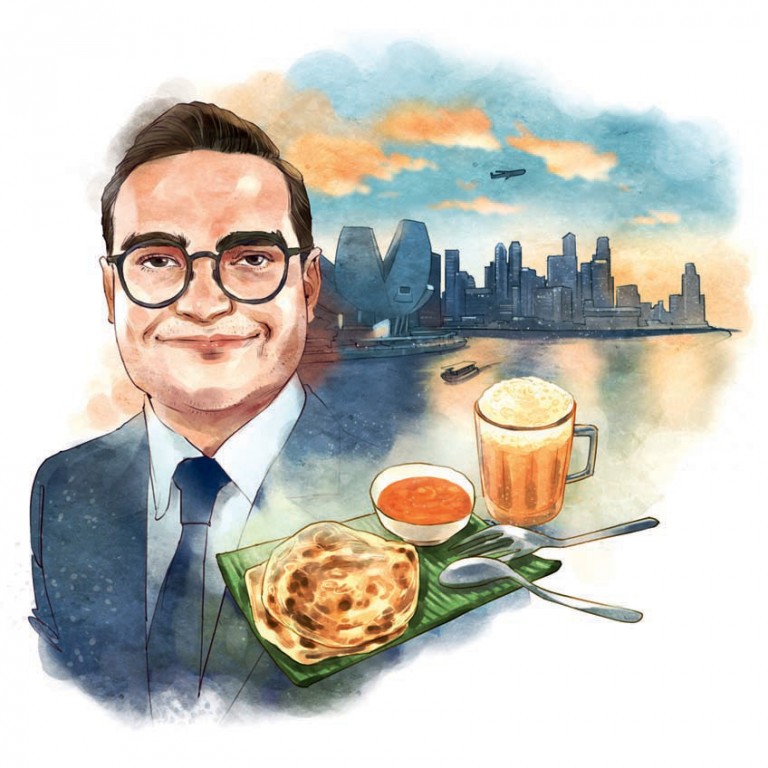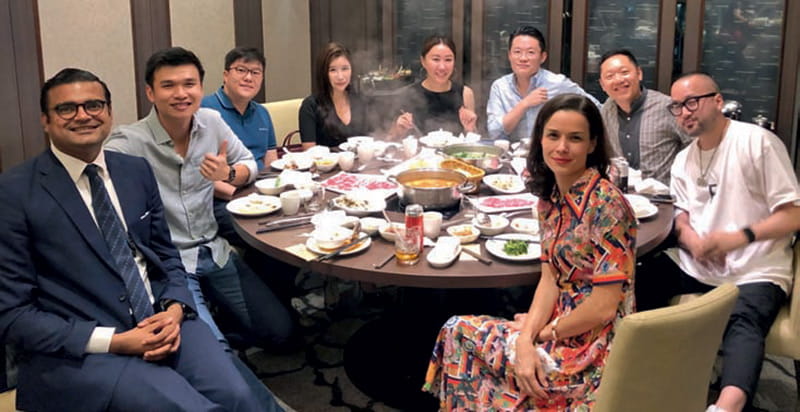Stories > Living Life Through Culture
Living Life Through Culture
Entrepreneur Jacob Puthenparambil shares why Singapore’s strong multicultural DNA, fused with efficiency and a global mindset, are its biggest assets in a rapidly changing world.
BY Shweta Parida
PHOTO Ken Lee
hen 12-year-old Mary went on a cultural learning journey to Beijing organised by her school, the local children and teachers were astounded to hear her speak in fluent Mandarin.
The primary school student stood out in the crowd because she was the only Indian among them – a story that her proud father, Singapore-based entrepreneur and communications specialist Jacob Puthenparambil, shares as often as he can.
This, he says, explains his move to Singapore in 2012 to head up the digital media communications department of a multinational creative agency. “I wanted to work in a place that offered a family-friendly environment and immersive culture,” says Puthenparambil, whose wife is a private banker. “My younger daughter Rita, who is 9, learns Malay in school.” His youngest child, Joseph, is 16 months old.

Jacob Puthenparambil’s decision to move to Singapore was driven by the fact that the country provides the right mix of commerce and culture, where diverse communities live in harmony.
The Indian national, who grew up in Saudi Arabia, studied in India and Germany, and worked in London and Dubai prior to moving here, says people have to think like global citizens in a highly connected world. “Singapore was especially appealing because it is a microcosm of diverse cultures,” says Puthenparambil, 40, who originally hails from the southern Indian state of Kerala, and traces his ancestry to Syria.
He soon saw the lack of home-grown communications firms that operated with an international remit and a wide range of functional mandate. “While there were many global firms who are capable of providing an entire suite of public relations services, I noticed that the regional mid-sized firms are content to work mainly on their home turf,” he shares. “We, on the other hand, wanted to be a home-grown company that could compete with the big boys of the industry globally and be as good, if not better.”
Inspired by Singapore’s history and growth story that also has a reverence for culture and heritage, he took a leaf out of the its book.
“I wanted to set up a brand, which like the ‘Singapore’ brand is deeply rooted in Asian culture, with a Singaporean DNA and a global reach.” This led to the founding of Redhill in 2014 along with Singaporean Surekha Yadav. The strategic communications firm has since expanded its presence to 19 cities worldwide.
A FAIR SYSTEM
For Puthenparambil, the Singapore brand is “a legendary story” that is now told in the learning centres of both developed and developing countries. “An island nation with no natural resources, and with just the dreams and aspirations of its people, and their willingness to work hard, that has propelled it into a league of its own.”
Citing the example of other home-grown multinational brands such as Singapore Airlines and DBS Bank, he shares that the foreign business community associates Singapore with efficiency, transparency and affordability. “There is no constant jumping through hoops or trying to second-guess what the guidelines or framework could be,” he says, adding that this was just one reason he chose to establish his firm’s head office here.

Wishing to be a part of Singapore’s thriving start-up culture, Puthenparambil continues to invest in local firms and mentor aspiring entrepreneurs.
He also points out that the island nation’s meritocracy-based social structure is a rarity. “In many countries, your connections and links to influential people matter in getting things done. But not in Singapore,” he says. “This ‘fairness’ is a safety net.”
AN EMOTIONAL CONNECTION
Having settled in Singapore seven years ago, he recalls his first visit to the country back in 2006. While sauntering about, he came across something that seemed “different amid the swanky buildings” but that connected with him instantly. It was a roti prata (pan-fried South Indian flatbread) and teh tarik (hot milk tea) stall in a nonair- conditioned coffee shop in the Central Business District.
“That contrasting image of this modern city – where a Singaporean hawker of Indian origin was selling something that I could relate to – was an emotional experience for me,” he recounts, adding that Singapore appeals to him because of the right mix of culture and commerce.
“Here, religious identity and personal beliefs do not interfere with people’s wish to live a modern lifestyle. On the contrary, you’re encouraged to preserve your culture while achieving economic success.” The best way to do so, he says, is to live through one’s culture rather than have it enforced. “If you stay connected to your roots, then your culture will live on.”
BUILDING AN ENTREPRENEURIAL CULTURE
Apart from the socio-cultural experiences, the work environment has been one of new learnings for the peripatetic entrepreneur.
“There is a huge difference between my entrepreneurial leanings and what I see in my Singaporean associates,” he notes.
“While for my parents, starting a business was a matter of survival – they were landowners in Kerala who had to hand over their land to the erstwhile communist government and move to Saudi Arabia.
They had to put food on the table. The same reasons have also driven me, to an extent. However, the young Singaporean entrepreneurs are motivated by their wish to create a positive change in society.”
He also notes that while he is a risk-taker, his Singaporean colleagues bring more structure and efficiency to the table. “I reckon it provides a great balance to the kind of work we do,” he muses.
What kind of Singaporean trait does he admire the most? “Singaporeans are always willing to give you a chance. You can meet the biggest CEO in an elevator and they will talk to you for five minutes. In most countries, you wouldn’t even be in the same elevator, let alone get a few minutes with them,” he observes, adding that this ideology of equal opportunity is the backbone of the country’s thriving SME business landscape.
“Singaporeans Are Always Willing To Give You A Chance. You Can Meet The Biggest Ceo In An Elevator And They Will Talk To You For Five Minutes. In Most Countries, You Wouldn’t Even Be In The Same Elevator, Let Alone Get A Few Minutes With Them.”
He opines that the accessibility to leaders is not just limited to the business realm here.
“Most Sundays, I go to the kopitiam and read the newspaper there with a kopi-o kosong [black coffee without sugar]. There I see the area’s Member of Parliament sitting and chatting with residents over a cup of coffee. That is a unique phenomenon.”
INVESTING IN GOOD IDEAS
As somebody who has set up a venture here, Puthenparambil takes an earnest interest in Singapore’s startup culture. He not only mentors aspiring entrepreneurs at the Singapore Management University (SMU) but also invests in businesses. He gives the example of Metro Residences, co-founded by Singaporeans James Chua and Lester Kang, which operates on a model similar to Airbnb but for corporate business travellers.
Another investment he is proud of is the homegrown business media firm founded by locally-based Indian journalist Joji Thomas Philip which recently got acquired by Nikkei of Japan. “My investments are largely driven by my instincts, based upon the concept and the founders’ conviction in their own idea.”
Despite his instinctive approach to investing in new businesses, he says that immigrants anywhere in the world have a higher sensitivity to failure. “You just have to make it work because you have a lot at stake.” Unsurprisingly, some of Singapore’s earliest immigrants have made an indelible impression on his outlook.
“People, such as Tan Tock Seng and Naraina Pillai, who landed on these shores more than a century ago with nothing, and became iconic business figures because they were resilient and able to adapt to changes,” he concludes.
